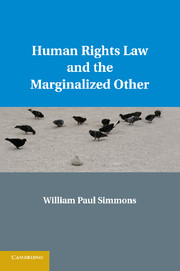Book contents
- Frontmatter
- Brief Contents
- Contents
- Preface
- Introduction
- Part I Deconstruction of Human Rights Law
- 1 Arendt, Little Rock, and the Cauterization of the Other
- 2 Democracy, Human Rights, and L’Affaire du Foulard
- Part II Phenomenology of the Saturated Other
- Part III Human Rights of the Marginalized Other
- Conclusion Working with the Marginalized Other to Deconstruct and Reinvigorate Human Rights Law
- Bibliography
- Index
- References
2 - Democracy, Human Rights, and L’Affaire du Foulard
from Part I - Deconstruction of Human Rights Law
Published online by Cambridge University Press: 07 October 2011
- Frontmatter
- Brief Contents
- Contents
- Preface
- Introduction
- Part I Deconstruction of Human Rights Law
- 1 Arendt, Little Rock, and the Cauterization of the Other
- 2 Democracy, Human Rights, and L’Affaire du Foulard
- Part II Phenomenology of the Saturated Other
- Part III Human Rights of the Marginalized Other
- Conclusion Working with the Marginalized Other to Deconstruct and Reinvigorate Human Rights Law
- Bibliography
- Index
- References
Summary
Political theorist Seyla Benhabib, like Hannah Arendt, develops a concrete universalism without deductive “banisters.” She democratizes, modernizes, and further concretizes Arendt’s theory of judgment and adds a cautious faith in international human rights law. More specifically, she has supplemented Arendt’s work with the concerns of feminist scholars and insights from Jürgen Habermas’ theory of discursive democracy. From her reading of feminist scholars, she is much more attuned to the ways that economic, social, and cultural conditions can silence the voice of the Other. From her reading of Habermas, she embraces a prominent role for wide-ranging and non-exclusionary discourse in the polis.
In her most recent works, Benhabib develops a theory of democratic iterations whereby “it is the people themselves who, through legislation and discursive will- and opinion-formation, must adopt policies and laws consonant with the cosmopolitan norms of universal hospitality” (2004, 177). Benhabib concedes that those who are excluded from the democratic/discursive space will most likely be those who are marginalized or silenced by politics and law, but “we can render these distinctions fluid and negotiable through processes of continuous and multiple democratic iterations” (2004, 177–178). In her most extensive practical treatment of democratic iterations, Benhabib argues that such iterations have characterized the French l’affaire du foulard (the headscarf affair). Although there were some periods of the minority, particularly female, voice being silenced, the process itself, Benhabib argues, could serve as a model for working out the complex interplays between such issues as judgment, universalism, minority rights, voice, agency, and secularism.
- Type
- Chapter
- Information
- Human Rights Law and the Marginalized Other , pp. 44 - 82Publisher: Cambridge University PressPrint publication year: 2011



